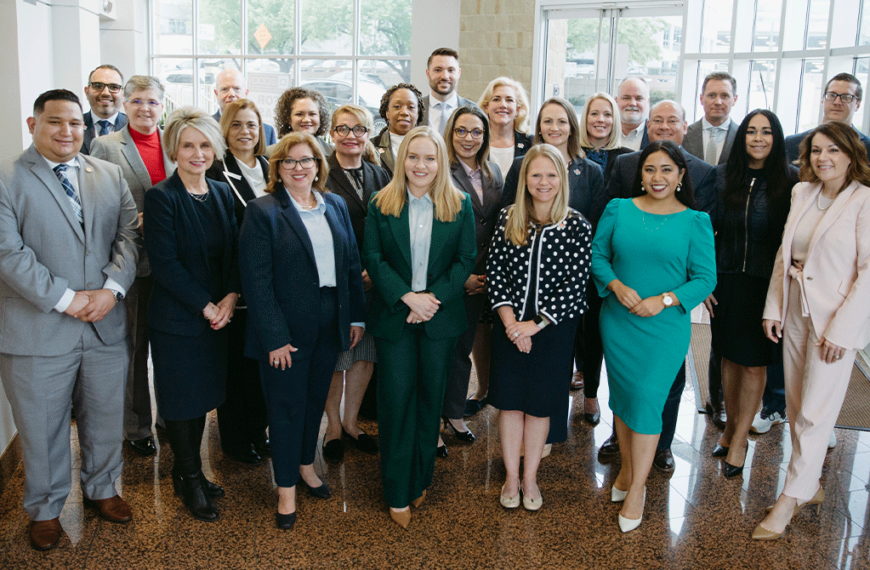Initiating statewide change requires considerable teamwork and a keen understanding of the legislative process. That’s why the Texas Hospital Association’s Leadership Fellows Program exists and how a recent capstone project within the program transformed from an idea to a legislative rider poised to improve the lives of Texas patients.

Kathy Griffis, vice president of clinical operations and chief nursing officer (CNO) at Titus Regional Medical Center (TRMC) in Mount Pleasant, is a THA Leadership Fellows alumna with an undeniable calling to help rural Texas hospitals improve patient care. Griffis is as passionate about data-driven improvements and advocacy as she is about each patient. So, when she first entered the CNO role at TRMC, CEO Terry Scoggin encouraged her to participate in THA’s Leadership Fellows Program.
The Leadership Fellows Program began in 2014 to provide health care leaders with in-depth knowledge of the legislative and regulatory process, introduce them to key policy issues, and connect them with policy shapers in Texas. Each cohort meets in Austin four times during the year to engage with experts, gain policy core competencies, and learn communications and presentation strategies.
“The program was created to not only provide grassroots champions for THA advocacy efforts but also to equip hospital leaders with the tools they need to advocate on issues in their hospitals or communities,” said THA’s Senior Director of Education and Governance Programs Lindsay Thompson.
The Capstone that Inspired a Movement
Each year, the Leadership Fellows Program culminates in a capstone project to address a real-world challenge for Texas hospitals. Past projects have centered on hospital funding, Medicaid expansion, behavioral health access, the impacts of COVID-19 on Texas hospitals, and workforce issues.
“The work that is done in the THA Leadership Fellows Program long outlives the duration of the program itself,” Thompson said. “While the capstone work centers around tackling top industry issues, we work with the Fellows to identify specific topics that are also most impactful to the work being done in their individual hospitals and communities.”
The capstone project has evolved over the years to parallel what THA’s advocacy staff identifies as potential policy priorities for the upcoming legislative session. In Griffis’ case, the project became policy itself.
Her 2022 cohort was tasked with finding ways to reduce workplace violence in Texas emergency departments. Between 2016 and 2018, the Texas Department of State Health Services (DSHS) found that 83% of the state’s nursing staff had experienced some type of workplace violence. Griffis worked alongside her co-Fellows, Baylor University Medical Center CEO Kyle Armstrong and Anil Sinha, M.D., chief medical officer at CHI St. Luke’s Health Brazosport in Lake Jackson, to identify and present a solution to a specific area within that framework. What they settled on stems directly from Griffis’ passion and experience: telepsychiatry consultations for rural hospitals.
“When you really hone in, the majority of violence in hospital settings happens in emergency departments because that’s where patients experience acute psychosis. They need help and are lashing out,” Griffis said. DSHS found that, as of 2018, the top three most successful strategies to prevent or reduce such workplace violence against nurses were staff training, involving law enforcement, and restricted access.
“So, we have good security systems in place, we learn how to de-escalate patients and calm them down, but we have a huge gap in care when it comes to psychiatrists who are available to emergency departments, especially in rural areas,” she added. “Our thought was that if we can get that expert consultation to the patient, we create a win-win for both the patient and the staff.”
There are more potential winners in this scenario, Griffis continued. “A psychiatrist can prescribe medications and treatments so that the patient can be released home sooner, which can help offload the mental health crisis in Texas state facilities,” she stated.
THA’s Vice President of Advocacy & Public Policy Sara González was impressed with how far-reaching the benefits of telepsychiatry consultations for rural Texas hospitals could be.
“One of THA’s longstanding policy goals has been to increase access to mental health care across the state. With the limited number of psychiatrists and mental health professionals, an initiative like this can really help both patients and hospitals provide the appropriate level of care in the appropriate care setting,” González explained. “The goal is to provide the best possible psychiatric care to patients in need regardless of where they are in the state, which can lead to better outcomes for both the patient and the providers. Without access to a psychiatrist, many patients and hospitals must wait for a bed to become available in another part of the state.”

How the Capstone Became Policy
Not long after Griffis and her team presented their capstone project, workplace violence prevention was chosen as a priority issue for the 2023 legislative session by THA and its advocacy partners, including the Texas Organization of Rural & Community Hospitals (TORCH). Simultaneously, Scoggin helped bring the capstone project to the attention of several supporting organizations, including the TRMC Veteran Program. Soon, with TORCH’s leadership, the proposal involved a rural Texas pilot program and collaboration with a Texas Tech University telepsych program run in coordination with several West Texas jails.
“We know 251 of 254 Texas Counties are designated health provider shortage areas (HPSA) for mental health care. We know mental health is a silent crisis, and we know rural Texas communities will struggle to recruit mental health professionals. So virtual mental health services hold a lot of promise to provide a solution to access for rural Texans,” said TORCH President and CEO John Henderson.
The capstone-turned-policy was accepted into the final budget that passed during the state of Texas’ 2023 regular legislative session. HHSC Rider 56 allocates $7.4 million in general revenue (GR) funds over a biennium for telepsychiatry consultations for rural hospitals and directs the Texas Health and Human Services Commission to contract with a statewide organization to implement it.
It’s an idea sparked by a bright leader on the front lines, fanned through the THA Fellows Program, and taken to the finish line through collaboration with organizations like TORCH. Henderson also credits the legislature for appropriating the money for the telepsych pilot in rural Texas. It’s an excellent example of how THA, TORCH and member hospitals like TRMC work together with lawmakers to create better policy for Texans.
“The thought of a capstone project can be daunting. It entails a lot of work put into something that may not be touched again. But with Kathy’s example, we can see how she didn’t set the work aside. She used the tools she gathered from the program to carry that work forward and put it in front of key decision-makers. Few professional development opportunities give you that platform to stand on. We are lucky to have the Fellows Program to provide that,” said Thompson.
And the journey doesn’t end there.
“Kathy’s work was not only called on by our advocacy team to support a THA priority issue, but Kathy and the TRMC team have also been called upon to share their work in the community and even other states. There could not be a better example of a grassroots health care advocate,” Thompson added.
For Griffis’ part, she’s thankful for the nudge that brought her to the Leadership Fellows Program in the first place. She credits Scoggin, who she said always listens and shares her passion in advocating for mental health patients in Texas. She’s excited to continue making incremental changes to improve patient care for rural Texans.
Related articles from The Scope
Meet THA’s 2024 Class of 24 Leadership Fellows
Last week, the Texas Hospital Association convened its 2024 cohort of Leadership Fellows at THA headquarters in Austin for the first of four in-person, two-day modules. With 24 fellows participating…
Hatching A Plan: One of Hospitals’ Own Running for Texas House
Political Advertising Paid for by HOSPAC. As Texas’ 2024 primary election approaches, Hatch Smith (R-Llano) is standing tall on hospital issues and trying to add a unique voice to the…
THA’s Testimony Tips
There’s an old axiom that goes, “If you’re not at the table, you’re on the menu.” The anonymous adage has been credited to a variety of individuals, mostly politicians, which…
Evolving as a Leader
As a former THA leadership fellow and with nearly two decades of hospital administration under his belt, Christopher Sandles, MBA, FACHE, is no stranger to health care leadership. Currently, Sandles…





